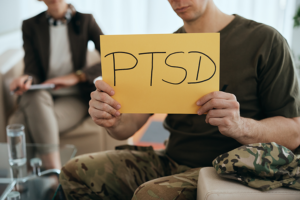Understanding Post-Traumatic Stress Disorder (PTSD) and Its Impact on Personality
Let’s talk briefly about Post-Traumatic Stress Disorder, or PTSD for short.
Imagine going through a really scary or bad experience, like a car accident or a fire. Afterwards, you might feel scared, have bad dreams, or get jumpy  when loud noises happen. Well, people with PTSD can have even stronger reactions that last a long time.
when loud noises happen. Well, people with PTSD can have even stronger reactions that last a long time.
PTSD happens when someone goes through something really upsetting or dangerous, and their mind has a hard time dealing with it. It’s like their brain gets stuck on the scary memory, and they keep reliving it, even when it’s over. This can be really tough for them.
Now, let’s talk about the top five personality traits of a person who has been diagnosed with PTSD. Remember, everyone is different, so not everyone with PTSD will have the same traits, but these are some common ones:
1. Hyperarousal: This is when someone is always on high alert, like they’re constantly waiting for something bad to happen. They might have trouble sleeping, get startled easily, or have trouble focusing. It’s like their brain is always in “fight or flight” mode.
2. Avoidance: People with PTSD might try to avoid things that remind them of the traumatic event. They might stay away from certain places, avoid talking about it, or even avoid people who remind them of what happened. They do this because they don’t want to feel the intense emotions associated with the event.
3. Re-experiencing: This trait means that the person keeps reliving the traumatic event in their mind. They might have flashbacks, where it feels like the event is happening all over again, or nightmares that replay the scary situation. It can be really distressing for them.
4. Negative changes in thinking and mood: Sometimes, someone with PTSD might start having negative thoughts about themselves or the world around them. They might feel guilty, blame themselves, or lose interest in things they used to enjoy. They might also feel numb or detached from others.
5. Emotional changes: People with PTSD often experience big changes in their emotions. They might feel more irritable or angry than they used to. They might also feel more anxious or sad. Sometimes, they might even feel guilty for surviving or feel like they don’t deserve happiness.
Remember, these traits are not something the person chooses to have. PTSD is a real struggle, but with the right support and treatment, people can learn to cope with it and get better. It’s important to be kind, understanding, and patient with someone who has PTSD.
If you ever come across someone with PTSD or if you’re experiencing it yourself, it’s a good idea to reach out to us by calling (405) 912-5145 or email us at info@ciokc.com.
